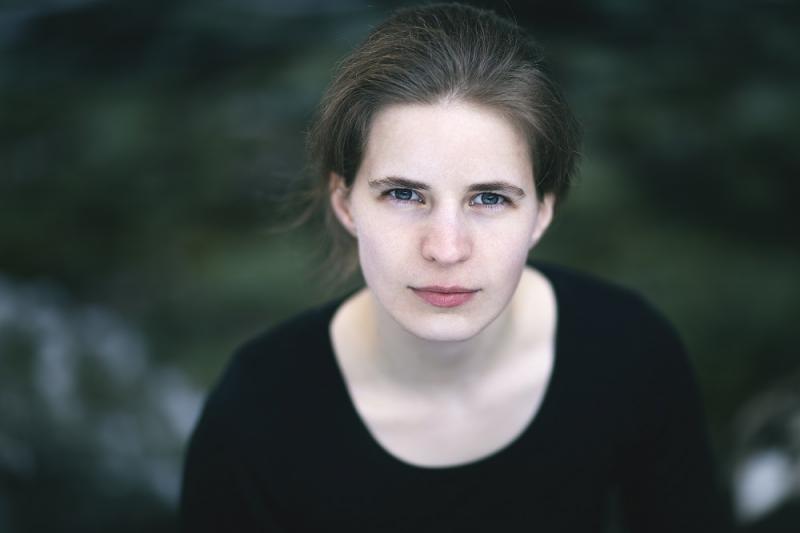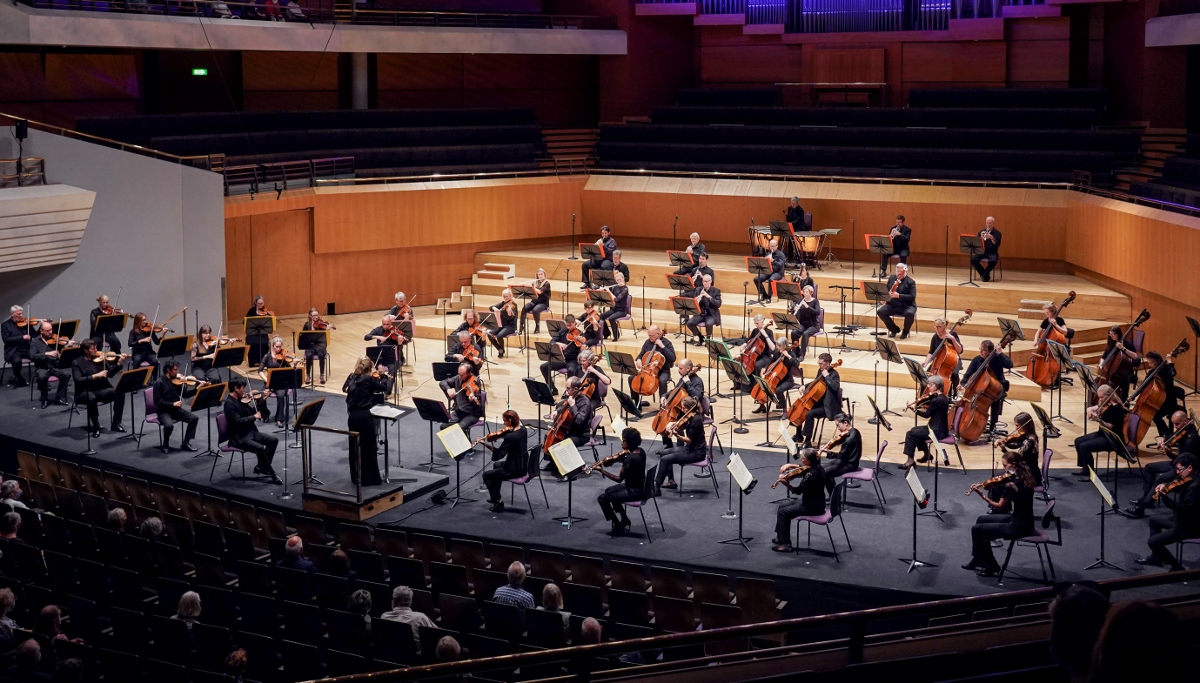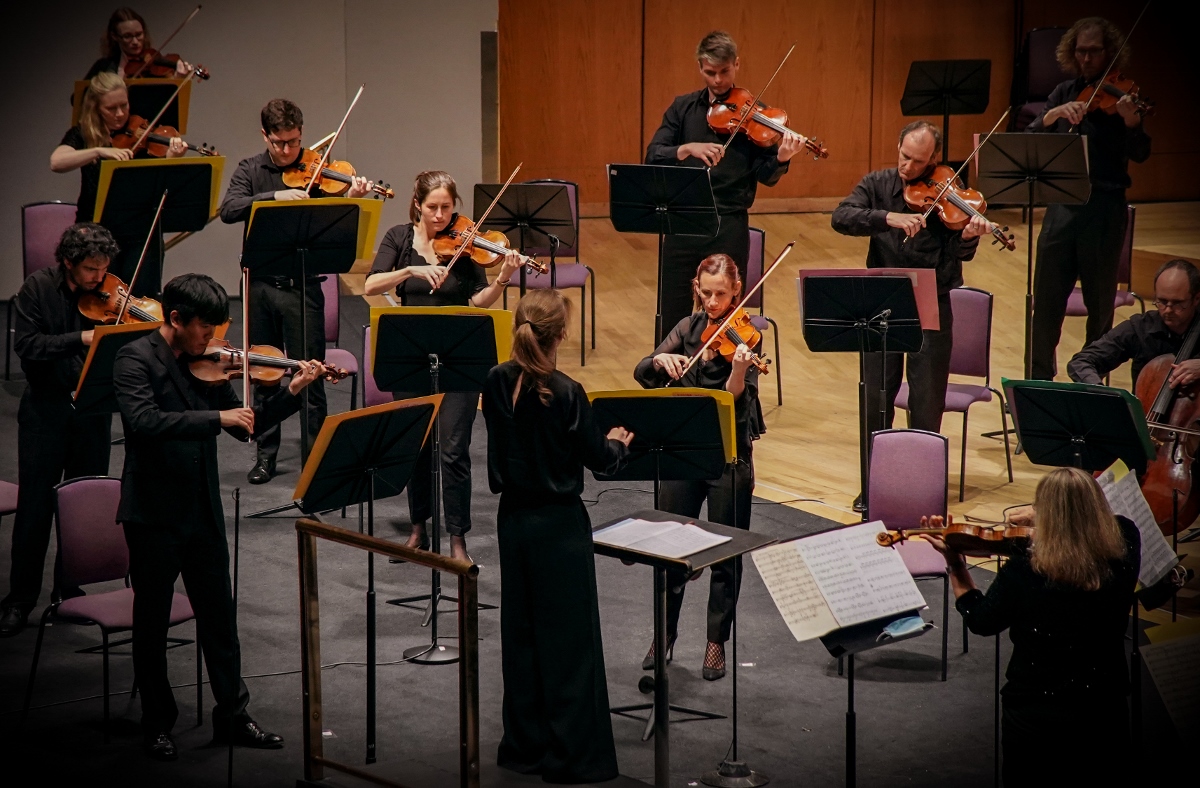Hallé, Berglund, Bridgewater Hall, Manchester review - taking Beethoven seriously | reviews, news & interviews
Hallé, Berglund, Bridgewater Hall, Manchester review - taking Beethoven seriously
Hallé, Berglund, Bridgewater Hall, Manchester review - taking Beethoven seriously
A young conductor brings confidence and maturity to the fore

Tabita Berglund is that rare species, an up-and-coming orchestral conductor attracting enough attention to secure repeated international bookings in even these straitened times. She also happens to be female and young, which until relatively recently would have been seen as another major handicap to success.
Berglund is a more mature, but equally determined, professional now than she was then. She’s very capable of taking an orchestra with her in her ideas of how music should sound: she smiles encouragingly at the players a lot and makes constant eye contact. Her stick - when she uses it; in the concert I saw yesterday it was used very little, and though that may have been partly accidental it showed she could conduct Beethoven’s Seventh without one if she had to - seems to be kept mainly for determining tempo. She exudes confidence, and so does her music-making.
At the same time she’s not assertive in the old-fashioned way, seeming almost self-deprecating in her podium manner. She told BBC Radio 3’s In Tune listeners this week that her becoming a conductor was “an accident”, but I think her powers of concentration and communication are such that it could hardly be as accidental as all that.  The programme for the Hallé’s second “Summer Season” concert back in its proper home at the Bridgewater Hall began with Wagner’s Siegfried Idyll. Tranquillity was the watchword here, as befits music written to wake a loved one on Christmas morning, and the tempo was relaxed. If you’ve ever visited the Wagners’ marital home at Tribschen near Lucerne, you may have wondered how even so small an orchestra as was there for the first performance managed to line up on what is really a rather modest staircase and landing and play softly and sweetly that day in 1870 – but love lends enchantment to all memories.
The programme for the Hallé’s second “Summer Season” concert back in its proper home at the Bridgewater Hall began with Wagner’s Siegfried Idyll. Tranquillity was the watchword here, as befits music written to wake a loved one on Christmas morning, and the tempo was relaxed. If you’ve ever visited the Wagners’ marital home at Tribschen near Lucerne, you may have wondered how even so small an orchestra as was there for the first performance managed to line up on what is really a rather modest staircase and landing and play softly and sweetly that day in 1870 – but love lends enchantment to all memories.
This performance, with relatively full orchestral forces (I counted 43 strings, with perhaps one more cello and one more bass than conventional balance mathematics would require), had its weighty moments and some brief excitement: as in the first of the 2021 in-person summer concerts, there was a greatly extended platform, with the musicians properly distanced from one another, and the larger sounding board seems to give their efforts more impact than usual.
Everything changed for Berglund’s choice of Osvaldo Golijov’s Last Round, written in 1996, including the musicians’ positioning and upright stance (except for the cellos, of course - the layout pictured below). Golijov says it’s conceived as an idealized bandoneon (the accordion-like instrument played by Piazzolla) and constitutes “a sublimated tango”. The players are arranged in two teams, set alongside and perhaps notionally against each other (one double bass is the referee), and the music constantly varies the weight of their sound by changing the numbers employed. The first section (the title references a fight, Piazzolla being known for getting into them) builds up to frantic climax and a thud – guess what that means – and the second, with its own title of “Deaths of the Angel” is a slow and misery-laden epilogue, with a multi-voiced anthemic rendering of a popular Argentine song creating its own climax and then dying away.  The concert was billed as “Beethoven’s Seventh”, and probably most of the audience had really come to hear that extraordinary symphony. They gave it a rapturous reception, with a standing ovation almost the equal of the one received by Sir Mark Elder and the orchestra for the first of the return-to-live-music concerts a fortnight ago. Berglund takes Beethoven at his word, and his notation. How often, even in recent memory, has received tradition overlaid them with other concepts, beautiful though those may have been … She repeats when he says repeat; she takes his metronome speeds seriously, no matter how risky the ride.
The concert was billed as “Beethoven’s Seventh”, and probably most of the audience had really come to hear that extraordinary symphony. They gave it a rapturous reception, with a standing ovation almost the equal of the one received by Sir Mark Elder and the orchestra for the first of the return-to-live-music concerts a fortnight ago. Berglund takes Beethoven at his word, and his notation. How often, even in recent memory, has received tradition overlaid them with other concepts, beautiful though those may have been … She repeats when he says repeat; she takes his metronome speeds seriously, no matter how risky the ride.
Those opening fp chords were massive sforzandi, and the dynamics left little in reserve for the fortissimi (let alone alone the fff) that were still to come, but no matter: she had the orchestra’s enthusiasm. If anything, it was holding it in check later that was to be more her problem. The first movement ended with the wind whooping and raising their pipes as if playing Mahler; both there and in the second, the power in the lower instruments told well – and the string playing (led by Peter Liang) was neatly articulated.
The scherzo was Presto and no mistake – skilfully modulated in the episodes where it’s meant to be slightly less pressed, but a helter-skelter of thrills and near-spills nonetheless. And the finale had that sweeping-all-before-it quality that an audience loves. This one certainly did.
rating
Explore topics
Share this article
The future of Arts Journalism
You can stop theartsdesk.com closing!
We urgently need financing to survive. Our fundraising drive has thus far raised £49,000 but we need to reach £100,000 or we will be forced to close. Please contribute here: https://gofund.me/c3f6033d
And if you can forward this information to anyone who might assist, we’d be grateful.

Subscribe to theartsdesk.com
Thank you for continuing to read our work on theartsdesk.com. For unlimited access to every article in its entirety, including our archive of more than 15,000 pieces, we're asking for £5 per month or £40 per year. We feel it's a very good deal, and hope you do too.
To take a subscription now simply click here.
And if you're looking for that extra gift for a friend or family member, why not treat them to a theartsdesk.com gift subscription?
more Classical music
 Goldscheider, Brother Tree Sound, Kings Place review - music of hope from a young composer
Unusual combination of horn, strings and electronics makes for some intriguing listening
Goldscheider, Brother Tree Sound, Kings Place review - music of hope from a young composer
Unusual combination of horn, strings and electronics makes for some intriguing listening
 theartsdesk Q&A: composer Donghoon Shin on his new concerto for pianist Seong-Jin Cho
Classical music makes its debut at London's K-Music Festival
theartsdesk Q&A: composer Donghoon Shin on his new concerto for pianist Seong-Jin Cho
Classical music makes its debut at London's K-Music Festival
 Helleur-Simcock, Hallé, Wong, Bridgewater Hall, Manchester review - moving lyricism in Elgar’s concerto
Season opener brings lyrical beauty, crisp confidence and a proper Romantic wallow
Helleur-Simcock, Hallé, Wong, Bridgewater Hall, Manchester review - moving lyricism in Elgar’s concerto
Season opener brings lyrical beauty, crisp confidence and a proper Romantic wallow
 Kohout, Spence, Braun, Manchester Camerata, Huth, RNCM, Manchester review - joy, insight, imagination and unanimity
Celebration of the past with stars of the future at the Royal Northern College
Kohout, Spence, Braun, Manchester Camerata, Huth, RNCM, Manchester review - joy, insight, imagination and unanimity
Celebration of the past with stars of the future at the Royal Northern College
 Jansen, LSO, Pappano, Barbican review - profound and bracing emotional workouts
Great soloist, conductor and orchestra take Britten and Shostakovich to the edge
Jansen, LSO, Pappano, Barbican review - profound and bracing emotional workouts
Great soloist, conductor and orchestra take Britten and Shostakovich to the edge
 Jakub Hrůša and Friends in Concert, Royal Opera review - fleshcreep in two uneven halves
Bartók kept short, and a sprawling Dvořák choral ballad done as well as it could be
Jakub Hrůša and Friends in Concert, Royal Opera review - fleshcreep in two uneven halves
Bartók kept short, and a sprawling Dvořák choral ballad done as well as it could be
 Hadelich, BBC Philharmonic, Storgårds, Bridgewater Hall, Manchester review - youth, fate and pain
Prokofiev in the hands of a fine violinist has surely never sounded better
Hadelich, BBC Philharmonic, Storgårds, Bridgewater Hall, Manchester review - youth, fate and pain
Prokofiev in the hands of a fine violinist has surely never sounded better
 Monteverdi Choir, ORR, Heras-Casado, St Martin-in-the-Fields review - flames of joy and sorrow
First-rate soloists, choir and orchestra unite in a blazing Mozart Requiem
Monteverdi Choir, ORR, Heras-Casado, St Martin-in-the-Fields review - flames of joy and sorrow
First-rate soloists, choir and orchestra unite in a blazing Mozart Requiem
 Cho, LSO, Pappano, Barbican review - finely-focused stormy weather
Chameleonic Seong-Jin Cho is a match for the fine-tuning of the LSO’s Chief Conductor
Cho, LSO, Pappano, Barbican review - finely-focused stormy weather
Chameleonic Seong-Jin Cho is a match for the fine-tuning of the LSO’s Chief Conductor
 Classical CDs: Shrouds, silhouettes and superstition
Cello concertos, choral collections and a stunning tribute to a contemporary giant
Classical CDs: Shrouds, silhouettes and superstition
Cello concertos, choral collections and a stunning tribute to a contemporary giant
 Appl, Levickis, Wigmore Hall review - fun to the fore in cabaret and show songs
A relaxed evening of light-hearted fare, with the accordion offering unusual colours
Appl, Levickis, Wigmore Hall review - fun to the fore in cabaret and show songs
A relaxed evening of light-hearted fare, with the accordion offering unusual colours
 Lammermuir Festival 2025, Part 2 review - from the soaringly sublime to the zoologically ridiculous
Bigger than ever, and the quality remains astonishingly high
Lammermuir Festival 2025, Part 2 review - from the soaringly sublime to the zoologically ridiculous
Bigger than ever, and the quality remains astonishingly high

Add comment